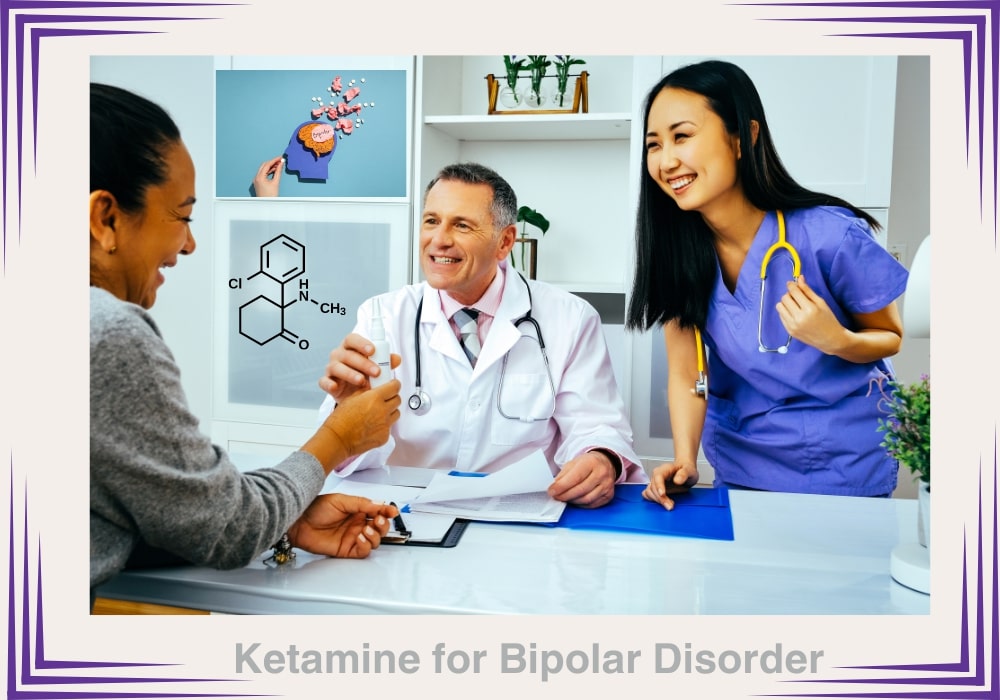Could a rapid-acting treatment change the lives of those with bipolar disorder? Exploring ketamine’s potential may unlock new paths to recovery.
Ketamine is emerging as a treatment option for bipolar disorder, raising important questions about its effectiveness. Understanding whether ketamine for bipolar disorder works is essential for patients searching for relief.
Research indicates that ketamine treatment for bipolar disorder can lead to rapid improvements in mental health. This innovative therapy offers new hope for patients with treatment-resistant bipolar depression.
What Is Ketamine for Bipolar Disorder?
Ketamine is a powerful, fast-acting medication that’s now being used to treat severe depression, posttraumatic stress disorder, and bipolar disorder symptoms.
Ketamine is mainly an anesthetic but is gaining attention for treating bipolar disorder. It may alleviate depressive symptoms in treatment-resistant bipolar depression. Ketamine can offer relief when traditional treatments fail.
In recent years, Ketamine for bipolar disorder has emerged as an innovative option. Many patients experience significant mood improvements after just one ketamine infusion. This rapid response can be life-changing for those struggling with the debilitating effects of bipolar disorder.
How Does Ketamine Treatment for Bipolar Disorder Work?
Discovering the science behind ketamine reveals its unique approach to mental health!
Let’s explore how ketamine functions in the brain and how it contrasts with traditional treatment methods.
How Ketamine Works in the Brain
Ketamine works differently than traditional antidepressants. It targets the N-methyl-D-aspartate (NMDA) receptor, helping to boost glutamate levels in the brain. This increase can promote synaptic connections and improve mood.
Many people experience rapid relief from depressive symptoms after a single ketamine infusion, often administered at a dose of 0.5 mg/kg. This quick response is especially beneficial for those with treatment-resistant bipolar depression. Unlike standard mood stabilizers, which may take weeks to work, ketamine offers faster results, even at low doses.
Differences from Traditional Treatments
Traditional treatments often focus on serotonin and norepinephrine levels. In contrast, ketamine’s unique mechanism provides a fresh approach to managing bipolar disorder. It also has a lower risk of cognitive impairment compared to some medications.
Moreover, ketamine therapy may help address suicidal ideation effectively. Patients often find this rapid relief transformative during depressive episodes. Understanding how ketamine works can empower you to explore all available treatment options for bipolar disorder.
How Can Patients Prepare for Ketamine Treatment?
Proper preparation can enhance the effectiveness of ketamine therapy!
Let’s explore some guidelines to help you get ready for your ketamine treatment.
Pre-Treatment Guidelines
Preparing for ketamine therapy can greatly enhance your experience. Here are some helpful steps to keep in mind:
- Consult Your Doctor: Discuss your medical history and medications with your doctor. This ensures a safe treatment plan.
- Avoid Alcohol and Drugs: Steer clear of alcohol and recreational drugs in the days leading up to your treatment. These substances can interfere with ketamine’s effects.
- Arrange Transportation: Since ketamine can cause temporary disorientation, plan for someone to drive you home after your session.
- Stay Hydrated: Drink plenty of water before treatment to help your body process the medication effectively.
Addressing Common Concerns
It’s normal to have questions or concerns about ketamine treatment. Let’s explore common topics to discuss with your doctor:
- Treatment Expectations: Ask about what to expect during and after your infusion. Understanding the process can ease anxiety.
- Potential Side Effects: Discuss possible side effects, including feelings of dissociation or mild hallucinations. Knowing what to anticipate can help you feel more at ease.
- Follow-Up Care: Inquire about any necessary follow-up appointments or additional treatments. Staying on track is crucial for managing bipolar disorder effectively.
What Are the Benefits of Ketamine for Bipolar Disorder?
Rapid relief from symptoms can be a crucial lifeline for those living with bipolar disorder.
Let’s explore the key benefits of ketamine treatment for bipolar disorder and how it can improve your mental health.
- Ketamine can relieve depressive symptoms quickly, often within hours.
- Many patients feel mood improvements shortly after their first infusion.
- It provides new hope for those with treatment-resistant bipolar depression.
- Ketamine helps stabilize mood swings and reduces depressive episodes.
- Rapid relief can lessen the intensity and duration of crises.
- It works well alongside mood stabilizers and other therapies for better results.
How Does Ketamine Compare to Other Treatments for Bipolar Disorder?
Comparing treatment options is crucial for making informed decisions about mental health!
Let’s take a closer look at how ketamine stacks up against traditional treatments for bipolar disorder.
Effectiveness
- Rapid Action: Ketamine provides quick relief from depressive symptoms, often within hours. Traditional medications can take weeks.
- Treatment-Resistant Patients: Ketamine shows promise for individuals with treatment-resistant bipolar depression, offering hope where others have failed.
- Improved Mood Stability: Ketamine can stabilize mood swings more effectively than traditional mood stabilizers.
Side Effects
- Fewer Long-Term Effects: Many patients experience fewer long-term side effects with ketamine than conventional medications.
- Short-Term Discomfort: Ketamine may cause temporary dissociation or mild hallucinations during treatment, but these effects are usually brief.
- Individual Variation: Each person’s response to ketamine can vary, making it essential to tailor treatment plans accordingly.
Overall Comparison
- Complementary Treatment: Ketamine can be used alongside mood stabilizers and antidepressants, enhancing overall treatment effectiveness.
- Research-Backed Promise: Ongoing studies continue to highlight ketamine’s potential benefits for bipolar disorder, particularly in rapid symptom relief.
- Empowered Choices: Understanding the differences between ketamine and traditional treatments helps patients and providers make informed care decisions.
Are There Risks or Side Effects of Ketamine for Bipolar Disorder?
Being informed about potential side effects is essential for any treatment decision!
Let’s explore the common side effects of ketamine treatment for bipolar disorder:
- Dissociation may occur during treatment, feeling strange or unsettling.
- Mild hallucinations can happen, but they usually pass quickly.
- Some patients may experience nausea, which is typically manageable.
- Drowsiness or sedation might be felt after treatment.
- Patients can experience a headache following the infusion.
- Some individuals report a feeling of detachment from reality.
- Short-term memory loss has been reported during or after treatment.
Who Is a Good Candidate for Ketamine Treatment for Bipolar Disorder?
Identifying the right candidates can lead to better outcomes in treatment!
Let’s discuss the criteria for eligibility and the importance of thorough mental health evaluations, using ketamine for bipolar disorder.
Treatment-Resistant Bipolar Depression
Ketamine can aid patients with treatment-resistant bipolar depression who haven’t responded to traditional mood stabilizers. It offers new hope for those struggling with ongoing depressive symptoms despite conventional treatments.
Severe Depressive Episodes
People with severe depressive episodes, including treatment-resistant major depression, may find relief through ketamine’s fast-acting antidepressant effects.
History of Mood Disorders
Individuals with bipolar or unipolar depression may benefit from ketamine therapy. It may also help those with suicidal ideation or anxiety when other treatments fail.
Mental Health Evaluations
A thorough mental health evaluation is essential before starting ketamine therapy to ensure it’s the right treatment approach.
What Do Studies Say About Ketamine Treatment for Bipolar Disorder?
Evidence-based insights can guide treatment choices and expectations!
Key Research Findings
- Rapid Relief: Studies show ketamine improves depression scores in hours. A study published in the Journal of Affective Disorders (J Affect Disord) demonstrated that even a single ketamine infusion could provide significant relief for patients suffering from bipolar depression.
- Efficacy: Research indicates significant effects in treatment-resistant bipolar depression at doses of 0.5 mg/kg, helping patients who have not responded to conventional therapies.
- Mood Stabilization: Ketamine may stabilize mood swings more effectively than traditional medications.
Clinical Trials
- Promising Results: Clinical trials highlight ketamine’s effectiveness for mood disorders.
- Comparative Advantage: Randomized controlled trials suggest it may outperform conventional mood stabilizers.
- Long-Term Potential: Ongoing studies explore the long-term effects of repeated ketamine infusions.
Patient Testimonials
- Positive Experiences: Many patients report relief from depressive symptoms after treatment.
- Hope for Recovery: Testimonials reveal newfound hope for those facing treatment-resistant major depression.
- Enhanced Quality of Life: Patients note improvements in daily functioning and emotional well-being.
How Does Ketamine Fit Into a Comprehensive Treatment Plan?
Integrating various treatments can provide a holistic approach to mental health!
Role of Ketamine in Treatment
Ketamine can improve treatment for bipolar disorder, particularly in individuals with treatment-resistant bipolar depression. When used alongside mood stabilizers, ketamine therapy may improve depressive symptoms and boost overall treatment efficacy.
Importance of Ongoing Support
Ongoing support is crucial for patients with bipolar disorder. Regular follow-ups can help monitor ketamine’s antidepressant effects and ensure safety, especially for those experiencing anxiety symptoms or suicidal ideation.
Community and Recovery
Engaging with community resources, such as support groups, can help patients with bipolar disorders feel less isolated. Combining ketamine treatment with psychotherapy encourages emotional well-being and promotes stability during depressive episodes, creating a more comprehensive recovery plan.
What’s the Future of Ketamine for Bipolar Disorder?
Let’s explore the future of ketamine in treating bipolar disorder.
Emerging Research
- Ongoing studies are investigating its long-term effects specifically for bipolar disorder.
- Ongoing trials aim to refine dosages and administration methods, ensuring safety and efficacy.
- Researchers are studying ketamine’s impact on suicidal thoughts in people with bipolar disorder.
Future Applications
- Ketamine may play a crucial role in personalized treatment plans.
- Combining ketamine with psychotherapy could enhance its effectiveness for bipolar depression.
- Researchers are investigating new formulations, such as oral ketamine, to improve accessibility.
- There’s potential for repeated ketamine infusions to provide sustained relief from depressive symptoms.
What Patients Can Expect
- Patients can anticipate ongoing improvements in treatment options.
- As research advances, more customized approaches will emerge.
- Collaborative care involving healthcare providers can optimize treatment outcomes.
FAQs
Can ketamine help with severe depressive episodes in bipolar disorder?
Yes, ketamine can quickly alleviate severe depressive episodes, especially in treatment-resistant cases.
How quickly can patients expect results from ketamine treatment?
Many patients experience rapid antidepressant effects within hours of a ketamine infusion, unlike traditional medications that may take weeks.
Is ketamine therapy safe for individuals with a history of manic episodes?
Patients with manic episode histories need careful monitoring during ketamine treatment.
How does ketamine compare to traditional mood stabilizers for bipolar treatment?
Ketamine generally acts faster and can help those unresponsive to mood stabilizers.
What should patients discuss with their doctor before starting ketamine therapy?
Patients should review their medical history and any current medications with their doctor.

Take the First Step Toward a Brighter Future!
If you are struggling with bipolar disorder or treatment-resistant depression, Contemporary Care Centers is here to help. We specialize in innovative therapies like ketamine treatment for bipolar disorder. Our personalized approach ensures effective care tailored to your unique needs.
At Contemporary Care Centers, we understand the challenges of mood disorders. Our team is dedicated to helping you find relief in a caring environment. Many patients see quick mood improvements with ketamine therapy, allowing them to regain control of their lives.
Don’t let bipolar disorder control your future. Contact us today to discover how ketamine treatment can change your life. We’ll help create a personalized care plan for better mental health. Visit our website or call now to take the first step toward a brighter tomorrow.



